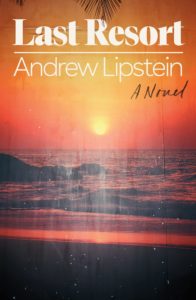“Last Resort”

Andrew Lipstein
Farrar, Straus and Giroux
At my alma mater Bryn Mawr College — only a mile away from its cousin Haverford College, where both author Andrew Lipstein and his novel “Last Resort”’s protagonist Caleb Horowitz are alumni — there’s a certain way people gossip.
The body language is unmistakable: the lowering of the voice to a sotto voce, the hunch and crouch of the shoulders, but most of all, the quick and discreet glance over the shoulder to ensure the subject of the conversation is not in your mudslinging perimeter.
Before you accuse me of lashon hara, know that every student participated in this cultural phenomenon, and quite a few got caught by their gossip-ee. After all, it’s a small school, even when you add in our consortium counterparts of Haverford students.
In his debut novel “Last Resort,” published Jan. 18, Lipstein manages to make the Brooklyn borough appear even smaller than the liberal arts school in the Philly ‘burbs and his protagonist much pettier than collegiate serial gossipers.
It’s hard not to get the sense that Caleb is a narcissist, or at least self-important. The entirety of the novel, written from his point of view, is formatted in long, block-shaped paragraphs. There’s no indentations or quotations for dialogue, only long strings of italicized sentences to illustrate someone else is talking in his stream-of-conscious prose.
Caleb is a cog in the startup machine by day — writing copy for Parachute, a loan company marketing itself as altruistic — and a writer by night. He took a several-month long sabbatical to Florida and the West Coast after initially moving to New York to work on his novel, which was immediately scrapped after a run-in with Haverford classmate Avi Dietsch.
Avi, mild-mannered and good-humored, is disdained by Caleb. Avi’s sandy, blonde hair and conventional handsomeness betrays his Semitic roots, Caleb thinks, something Caleb is a bit jealous of, or just irked by.
But Avi is also a masterful storyteller, sharing with Caleb over pizza and gin his tales vacationing and meeting a free-spirited woman who takes him on a salacious and winding adventure. His story has a heartbreaking twist ending, and Avi was so touched by his experiences that he wrote them into a short story, which he generously shares with Caleb.
Interpreting Avi’s gesture a little too generously, Caleb writes a new novel inspired by Avi’s story, and the novel hooks the interest of an enthusiastic agent. As the agent tries to secure Caleb a book deal, the manuscript mistakenly finds its way to Avi, a book agent, who demands some sort of compensation.
After a series of confrontations of increasing intensity, the pair settle on a solution with the help of a lawyer and Caleb’s agent: Avi’s name will be printed on the book, but Caleb will receive the manuscript’s hefty advance and royalties, which end up a pretty penny after the book’s runaway success.
While Caleb may now be banking on a career as a writer, he has established himself as an opportunist above all.
Caleb, despite seemingly drawing the longer straw and coming out on top after the book’s release, only masquerades as nefarious. He intends to be cunning and cutthroat, but his clumsy, shoot-from-the-waist texts to Avi that could get him in trouble give hint that he doesn’t really know how to get away with theft.
Underwhelming at first, “Last Resort” seamlessly and unsuspectingly raises the stakes of the book’s narrative. Lipstein’s attention to detail, diary-like writing and tongue-in-cheek humor add realism to a story that could easily fall off the rails on any page. The author’s restraint has great pay-off; Caleb becomes a rich, multi-dimensional character whose actions make the reader’s muscles clench with apprehension.
However, at times, his character feels a little flimsy and too good to be true. The guy who frequently concocts a weed/Xanax/alcohol cocktail and survives off of Trader Joe’s freezer meals wakes up and runs 15 miles the next morning, really? Then again, maybe Caleb has just cemented himself as an unreliable narrator, trying to paint himself as a protagonist and not an antihero.
“Last Resort” is more than just a double entendre; it cleverly shares the title of the book Caleb and Avi publish. Picking up a novel from the point of view of a shoddy narrator, the real-life reader can’t help but feel an extra layer of suspicion given the novel’s self-referential nature.
[email protected]; 215-832-0741






